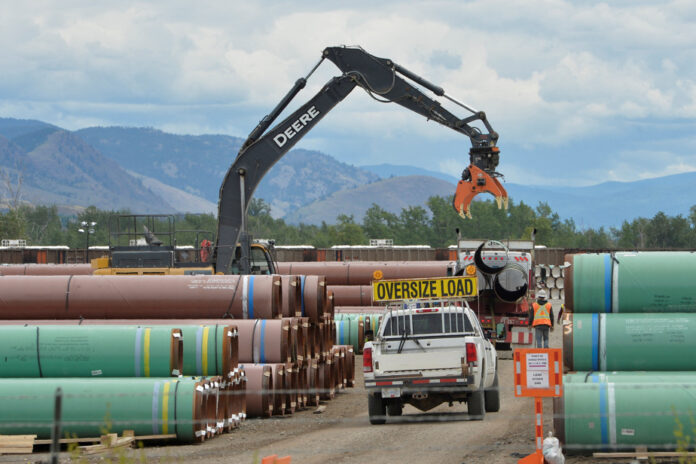(Calgary) The Crown corporation behind the Trans Mountain pipeline expansion fears it won’t complete the project on schedule, despite internal and external pressure to do so, documents obtained by La Presse show. Canadian.
The Trans Mountain pipeline is the only pipeline system in Canada carrying oil from Alberta to the West Coast. Its expansion, currently underway, will bring the pipeline’s capacity to 890,000 barrels per day (bpd), from the current 300,000 bpd.
Trans Mountain Corp. has long stated that its target date for the mechanical completion of the project is sometime in the third quarter of this year (which ends September 30), with the pipeline’s in-service date expected in early 2024.
Now, new regulatory filings by a BC First Nation reveal the extent of the timeline pressure facing the pipeline company.
In a letter to the Canada Energy Regulator, dated August 28, a lawyer for Stk’emlupsemc te Secwepemc details a meeting First Nation leaders had with Trans Mountain leaders about changing proposed route.
According to the filing, Trans Mountain President and CEO Dawn Farrell said technical difficulties in drilling a tunnel in British Columbia would be problematic. This means that the company can no longer complete the section of pipeline in question using a trenchless construction method, as promised.
“I know that additional delays do not concern you, but it causes us problems with the schedule. Significant issues, argued Ms. Farrell, quoted by counsel. We are forced to turn to options that are economical and achievable within the time remaining. »
Stk’emlupsemc te Secwepemc’s letter also states that Trans Mountain never stated that the originally proposed construction method was impossible, merely that it could not be completed in time to meet the pipeline’s in-service date. , January 1, 2024.
“We have come to the conclusion that we are not going to be able to complete this tunnel in time to meet the requirements and bring this project online,” the First Nation said, citing Trans Mountain. At this point, completing the project and putting it into operation is necessary. The executive has said it clearly, the board has said it clearly. This is an expectation of the contracts we have in place. »
The Stk’emlupsemc te Secwepemc state in their regulatory filing that the area has “deep spiritual and cultural significance” to their community and that they only consented to the construction of the pipeline knowing that Trans Mountain would minimize disruption to surface by implementing a specific trenchless construction.
“Trans Mountain has failed to demonstrate that the trenchless construction methods in the Pipsell (Jacko Lake) corridor, approved as part of the previous diversion application, are no longer a viable construction method,” argued Trans Mountain. First Nation.
“Trans Mountain has made it clear that financial considerations and Trans Mountain’s preference for an in-service date of January 1, 2024 are the rationale for submitting the waiver request.”
The Trans Mountain pipeline project is in trouble. The pipeline was bought by the federal government for $4.5 billion in 2018 after former owner Kinder Morgan Canada threatened to abandon the planned expansion project due to opposition from environmentalists and regulatory hurdles .
Its projected price has since skyrocketed, first to $12.6 billion, then to $21.4 billion and more recently to $30.9 billion (the most recent capital cost estimate is from March 2019). This year).
The federal government has already approved a total of $13 billion in loan guarantees to help Trans Mountain secure the financing needed to cover cost overruns.
Trans Mountain Corp. blamed its budget problems on a variety of factors, including inflation, COVID-19, labor shortages, supply chain challenges, flooding in British Columbia and unexpected major archaeological discoveries while along the route.
This latest construction hurdle doesn’t bode well for the company’s schedule or budget, said Richard Masson, associate executive at the University of Calgary’s School of Public Policy.
“It’s unlikely, in my view, that the company will get quick deviation approval on something they’ve made a commitment to a First Nation for,” he explained in an interview.
He added that while Trans Mountain waits for the regulator to make a decision on its request to move the pipeline route, its labor costs will continue to rise.
The federal government, which is seeking to divest the pipeline and has entered into negotiations with several interested buyers, will not be able to sell it until a final construction cost and in-service date are determined.
Meanwhile, Trans Mountain has filed for regulatory approval for the fees it wants to charge oil shippers when the pipeline comes into operation. But the oil companies, frustrated by the higher tolls that Trans Mountain deems necessary because of the exorbitant price of the pipeline, are reacting.
The Canada Energy Regulator has not yet made a decision on the toll issue and has agreed to give shippers until August 30 to file written statements.















